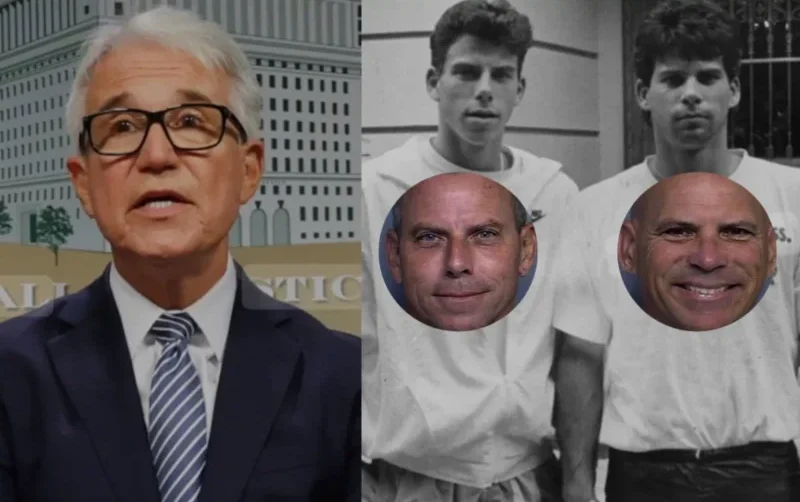Understanding the Original Case
The Menendez brothers, Lyle and Erik, became synonymous with a horrific crime that shocked the American public in 1989. Charged with the brutal murders of their wealthy parents, Jose and Kitty Menendez, the case was characterized by its complexities and the emotional tumult surrounding it. Initial investigations revealed that the brothers had shot their parents multiple times with shotguns, leading to widespread media coverage that captivated the nation.
As the trial unfolded, the defense introduced a narrative suggesting that the brothers had acted out of a deep-seated fear and trauma stemming from their parents’ abusive behavior. They claimed that the Menendez family dynamic was fraught with accusations of physical and emotional abuse, presenting audio recordings and testimonies that painted a troubling picture of their upbringing. The defense’s strategy aimed to elicit sympathy from the jury, portraying Lyle and Erik as victims themselves, struggling with the legacy of their parents’ alleged brutality.
The prosecution, on the other hand, maintained that the murders were premeditated and motivated by the brothers’ desire to inherit their parents’ substantial wealth. They argued that the brothers crafted a story of abuse to justify their heinous actions and to elicit public sympathy. This dichotomy between the defense’s portrayal of victimization and the prosecution’s assertion of greed added layers of intrigue and tension to the trial.
Ultimately, the jury found the Menendez brothers guilty, resulting in life sentences without the possibility of parole. This verdict has endured scrutiny and debate over the years, as the case remains a salient example of the complexities surrounding familial relationships, psychological trauma, and the judicial system. The evolving perceptions of the original case continue to influence discussions regarding the recent recommendation for resentencing, laying the groundwork for an ongoing conversation about justice and redemption.
Recent Developments: Prosecutor’s Recommendation
In recent developments regarding the Menendez brothers, the prosecution has made a notable recommendation for resentencing, casting a new light on the decades-old murders of their parents, Mary and Jose Menendez. This recommendation is underpinned by a combination of evolving legal perspectives and emerging evidence that sheds new insights into the case, stirring both public and legal debate.
The prosecutor’s call for resentencing stems from a re-evaluation of the circumstances surrounding the crime, particularly the psychological trauma experienced by the brothers during their childhood. Legal experts have pointed out the significance of newly available psychiatric evaluations that suggest the severity of their abuse may have warranted consideration during their original trial. Additionally, there is an argument that the legal system’s understanding of childhood trauma has changed drastically since the initial sentencing, potentially influencing future judicial outcomes.
As attorneys for the Menendez brothers seek to capitalize on these developments, the implications for their sentencing could be profound. If the court grants the prosecutor’s recommendation, this could lead to a reduction of their life sentences without parole, previously handed down in 1996. Such a decision might allow for the prospect of parole, fundamentally altering the future landscape for the brothers, who have spent more than three decades behind bars. The renewed focus on the brothers’ mental health, coupled with the evolving societal views on juvenile offenders, may serve as a pivotal factor in the case proceedings.
In light of these developments, the Menendez brothers’ case remains under scrutiny, with legal analysts monitoring potential outcomes closely. The progression of this case could set significant legal precedents relating to how psychological factors are weighed in cases involving historical crimes, especially those committed by individuals with a history of trauma.
Public and Legal Reactions
The recent recommendation from the prosecutor to pursue resentencing for the Menendez brothers has sparked a plethora of reactions from various segments of society. Public opinion has evolved over the decades since the notorious murders of José and Mary Menendez in 1989. Initially viewed with both shock and empathy, the perception of Erik and Lyle Menendez shifted over time. The brothers’ legal battles, media portrayals, and the emergence of discussions surrounding mental health, familial trauma, and justice have contributed to a complex societal view. Some members of the public believe that resentencing is unjust given the length of time served and the mental health revelations that have surfaced, while others see it as a necessary step toward accountability.
Legal experts have weighed in on the implications of the prosecutor’s recommendation. Many argue that resentencing could set a precedent for similar cases where defendants claim their actions were rooted in abuse and psychological distress. This could lead to significant changes in how the legal system addresses childhood trauma in violent crime, which is a topic of growing concern within criminal justice reform circles. Advocates for reform express support for this approach, emphasizing the importance of scrutinizing long-held perceptions surrounding justice and punishment, particularly for cases involving trauma. However, this view is not without its dissenters; some legal analysts contend that seeking resentencing undermines the gravity of the initial verdict and the impact of the crimes committed.
Additionally, the families of the victims have shared their perspectives, highlighting the emotional toll that this renewed focus on the case has inflicted. For them, the memories of the tragic events remain vivid, and the suggestion of resentencing raises feelings of anger and confusion. Their opinions reveal a divide; while some advocate for closure through reexamination of the case, others argue that confronting the past should not result in further legal proceedings for the Menendez brothers. This emotional complexity showcases the multifaceted nature of public and legal reactions to the prosecutor’s recommendation.
Looking Ahead: Next Steps in the Case
The recent recommendation by the prosecutor for resentencing the Menendez brothers highlights a pivotal moment in a case that has captivated public attention for decades. Following this development, the defense team is expected to prepare a comprehensive response aimed at influencing the court’s decision. This response will likely include arguments emphasizing the brothers’ age at the time of the crime, the psychological trauma they endured, and evolving perspectives on punishment relative to juvenile offenders. Such discussions are increasingly relevant given the ongoing dialogue around the rehabilitation potential for individuals sentenced as minors.
Potential court dates will be crucial markers in this unfolding narrative. Legal analysts anticipate that the court may schedule hearings in the coming months where both sides will present their arguments. It is essential for observers to keep an eye on these dates, as they will not only affect the Menendez brothers’ future but could also set significant precedents for similar cases. The outcomes of these hearings may invite scrutiny of existing sentencing guidelines, particularly concerning cases involving young defendants, thereby potentially reshaping interpretations of justice in the modern era.
Furthermore, the broader implications of this case extend into the overarching frameworks of the criminal justice system. As legal standards evolve and public sentiment shifts, the Menendez brothers’ situation may prompt future reconsiderations of sentencing definitions and practices across the nation. Courts may increasingly evaluate past convictions under contemporary lenses, particularly as revelations about childhood trauma and its psychological effects gain acknowledgment within legal proceedings. Therefore, as the case progresses, it will serve not only as a pivotal moment for the Menendez brothers but also as a potential catalyst for significant change in the justice system, paving the way for more humane treatment of juveniles in the legal realm.




